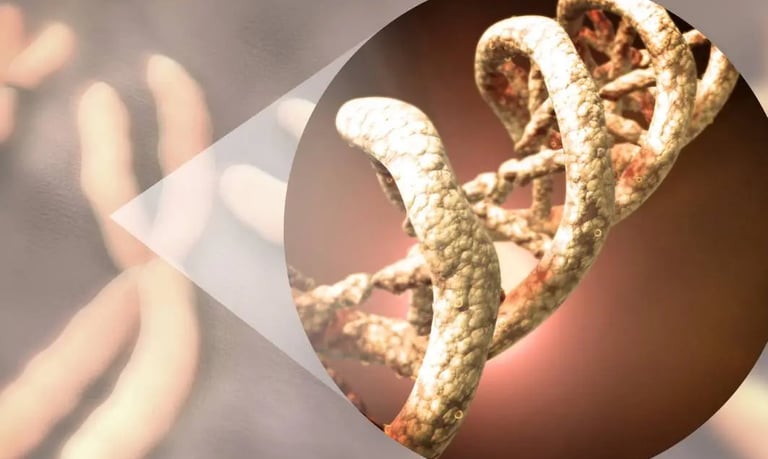Gene Therapy for Longevity: How CRISPR and Epigenetics Could Extend Lifespan
BIOHACKING


The idea of extending human lifespan has fascinated scientists, philosophers, and futurists for centuries. Today, gene therapy is emerging as one of the most promising frontiers in longevity research. By manipulating genes and influencing epigenetic markers, scientists hope to slow ageing, reverse cellular damage, and extend human healthspan—the number of years we live free from disease.
At the forefront of this movement are CRISPR gene editing and epigenetic reprogramming, two groundbreaking technologies that may allow us to modify ageing at the genetic level. But how realistic is this vision, and what are the challenges involved?
Let’s explore how gene therapy could redefine human longevity and the ethical and scientific questions that come with it.
Understanding the Role of Genes in Ageing
Ageing is a complex process influenced by genetic, environmental, and lifestyle factors. While no single "ageing gene" exists, scientists have identified key genetic pathways that contribute to longevity. These include:
The Sirtuin Genes (SIRT1-SIRT7) – Involved in cellular repair, metabolism, and stress resistance.
FOXO3 – Linked to increased lifespan in humans; helps regulate oxidative stress.
mTOR Pathway – Controls cell growth and metabolism; inhibiting it (e.g., with rapamycin) has been shown to extend lifespan in animals.
Telomerase (TERT Gene) – Helps maintain telomere length, which protects chromosomes from ageing-related damage.
By modifying these genetic pathways, scientists believe they can slow down or even reverse aspects of ageing.
CRISPR: Rewriting the Code of Life for Longevity
What is CRISPR?
CRISPR (Clustered Regularly Interspaced Short Palindromic Repeats) is a gene-editing technology that allows scientists to precisely cut, remove, or modify specific sections of DNA. It acts like a pair of molecular "scissors" that can edit genetic mutations linked to disease and ageing.
How Could CRISPR Extend Lifespan?
Researchers are using CRISPR to:
Remove Ageing-Related Genetic Damage – Scientists can edit genes that contribute to age-related diseases such as Alzheimer’s, heart disease, and cancer.
Enhance Cellular Repair Mechanisms – By modifying genes like FOXO3, CRISPR could boost the body's natural defences against oxidative stress.
Restore Telomeres – Shortened telomeres are a hallmark of ageing; gene therapy could help lengthen them, improving cell function.
Reverse Cellular Senescence – Senescent cells (also known as "zombie cells") contribute to inflammation and ageing. CRISPR could target and remove these cells.
Breakthroughs in CRISPR Longevity Research
Several studies have already demonstrated CRISPR’s potential in longevity science:
Harvard Medical School (2021): Researchers used CRISPR to edit the genes of mice with progeria (a premature ageing disease), increasing their lifespan by 30%.
Salk Institute (2022): Scientists reprogrammed aged cells using CRISPR-based epigenetic editing, restoring them to a more youthful state.
Chinese Academy of Sciences (2023): CRISPR was used to modify genes linked to muscle deterioration, improving strength and endurance in aged mice.
While these findings are promising, human trials are still in their early stages. The challenge lies in safely and precisely applying CRISPR to human longevity without unintended consequences.
Epigenetics: Reprogramming the Ageing Process
What is Epigenetics?
Unlike CRISPR, which directly edits DNA, epigenetics focuses on how genes are expressed. Certain lifestyle factors, environmental exposures, and even stress can turn genes "on" or "off" without altering their actual sequence.
Key Epigenetic Factors That Influence Longevity:
DNA Methylation – The process of adding chemical markers (methyl groups) to DNA, which affects gene expression.
Histone Modification – Changes to proteins that help organise DNA, influencing which genes are activated.
Non-Coding RNA (ncRNA) – Molecules that regulate gene expression at the cellular level.
How Epigenetic Reprogramming Could Extend Lifespan
Scientists are exploring ways to reverse the epigenetic changes associated with ageing by:
Reprogramming Old Cells into Younger States – The Yamanaka Factors, a set of four genes (OCT4, SOX2, KLF4, MYC), can turn aged cells into youthful, stem-cell-like states.
Reducing Inflammation and Oxidative Stress – Certain epigenetic interventions could help suppress chronic inflammation, a major driver of ageing.
Improving Metabolic Function – Reprogramming metabolism-related genes could enhance energy production and cellular efficiency.
One of the most famous experiments in epigenetic longevity comes from Dr. David Sinclair, a Harvard researcher who has successfully reversed aspects of ageing in mice by manipulating epigenetic pathways. His work suggests that ageing is not a fixed process but one that can be reprogrammed.
Challenges and Ethical Considerations
Despite its potential, gene therapy for longevity is not without risks.
Scientific Challenges:
Unintended Genetic Mutations – CRISPR edits could cause unintended genetic changes with unknown long-term effects.
Delivery Methods – Efficiently delivering gene-editing tools into the body remains a significant hurdle.
Longevity vs. Healthspan – Living longer doesn’t necessarily mean living better; extending lifespan without improving quality of life is not the goal.
Ethical Questions:
Who Gets Access? – If gene therapy extends lifespan, will it only be available to the wealthy?
Overpopulation Concerns – What happens if humans live significantly longer? Could this strain resources?
"Playing God" Debate – Should we alter the human genome for longevity, or is ageing a natural part of life?
These are important discussions as gene therapy moves closer to human applications.
The Future of Gene Therapy for Longevity
Gene therapy is still in its early stages, but it holds immense potential to reshape human health and longevity. Over the next decade, we can expect:
More clinical trials testing CRISPR and epigenetic therapies in humans.
Personalised longevity treatments, where gene therapy is tailored to an individual’s DNA.
Combinations of gene therapy with AI and biotech for better predictive health insights.
While we are still far from an "immortality pill," gene therapy could soon make age-related diseases preventable and ageing more manageable.
For now, longevity enthusiasts can focus on lifestyle-based epigenetic interventions—such as exercise, diet, fasting, and stress management—which have already been shown to slow biological ageing.
Final Thoughts
Gene therapy for longevity represents a paradigm shift in medicine. Instead of just treating diseases after they appear, we may soon have the ability to reprogram ageing at its core.
With CRISPR and epigenetics paving the way, the question is no longer "Can we extend lifespan?" but rather "How far should we go?"
One thing is certain: the future of longevity science is just getting started.


